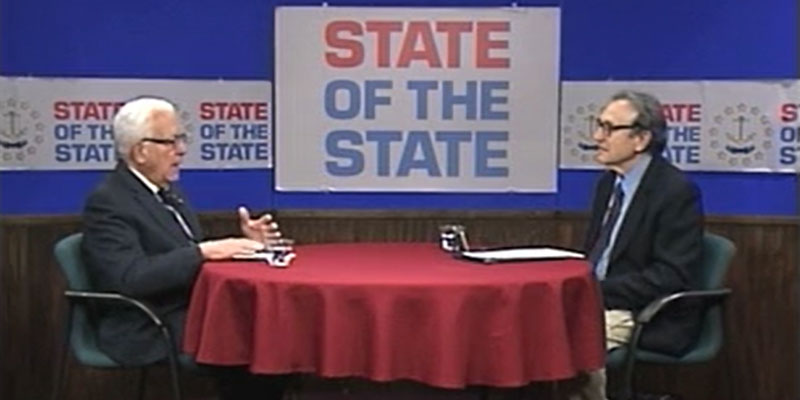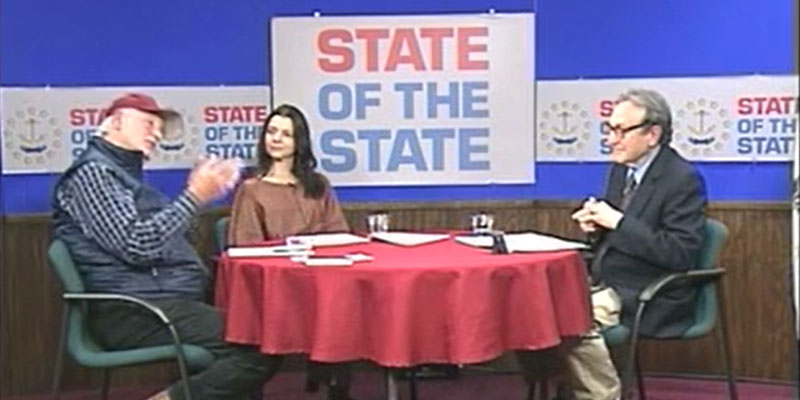I should probably start by acknowledging my naivete. Middle age had descended thoroughly before it even occurred to me that some of the strange responses I experienced from adults as a teen, particularly in sports, might have had something to do with physical abnormalities with which I was born. In my defense, the peculiarity of my psychology was so manifest that it could easily hide irrational responses to my physiology behind its explanatory power.
Similarly, it wasn’t until I was fully embroiled in local politics that I started to pick up on the subtle origins of seemingly irrational insults and conspicuous curiosity about whether Jewishness follows the maternal or paternal line. If the former, you see, my Jewish last name could be disengaged from that portion of my heritage. By belief and conversion, I’m Catholic, so as long as my grandmother wasn’t the Jewish half of my grandparents’ marriage, antisemites could treat me normally on a technicality. (Those issuing insults weren’t as concerned about precision.)
I provide these personal details as context for my response to Boston Globe reporter Edward Fitzpatrick’s interview with Adam Greenman of the Jewish Alliance of Greater Rhode Island, about the “‘alarming’ rise in antisemitism.” Well-informed readers will probably suspect immediately that the impetus for the interview was commentary from the peculiar MAGA celebrity Kanye West and, if they share my general political stance, they will muse that similar statements from left-wing anti-Semites never seem to generate these ancillary materials. Of course, being local, Greenman and Fitzpatrick localize it with reference to a handful of pro-Kanye flyers appearing in Warwick. Here’s Greenman:
It tells us that white supremacists are feeling more emboldened in Rhode Island and more comfortable spreading their hate here. Earlier this year, we saw them demonstrating in Providence, and the leafleting in Warwick is the latest of several like-incidents in just the last few weeks. Their goal is to scare and intimidate, and we won’t let them. It’s critically important for the larger Rhode Island community to stand with us and send a message that this kind of hate is not welcome here.
Yeah… well… I’m not so sure a smattering of anonymous “flyers” is evidence that people are “comfortable” promoting a particular message. More importantly, I differ from Greenman in that I want them to be more comfortable expressing their views, not less. Contrary to Greenman, Fitzpatrick, Governor McKee, Providence Mayor Elorza, and others, including Rhode Island law enforcement officials, I don’t want people who believe such things to feel as if they risk criminal investigation if they are identified for their speech.
After my decades of apparent naivete, I’d much rather have people tell me what they think, so I can understand their behavior and explore the possibility of explaining to them why they’re wrong to feel as they do. I don’t buy the implication (which is either insecurity, inverted bigotry, or cynical posturing) that freely expressed bigotry will inevitably win converts. I believe in people and expect the opposite result.
Greenman worries that “social media has allowed [antisemitic] conspiracy theories to spread much further,” but I just can’t see how asserting the power to “stamp out” their speech (in contravention of an ostensible right guaranteed by the First Amendment) disproves, rather than reinforcing, such claims.
Of course, I don’t share Greenman’s financial interests. According to tax filings, his organization takes in and spends around $7-8 million each year, and he takes home about $200,000 in compensation from the alliance and “related organizations.”
Contrary to the inevitable complaints of Greenman’s allies in the Antidefamation League that I’m leaning on some antisemitic trope about money, this is simply first-pass journalism of the sort that Fitzpatrick would surely conduct were Greenman a paid advocate for a different cause. The key point is that he has an immediate financial interest in amplifying the concerns of his donors, as well as fostering the belief that the direct advocacy he provides can resolve their discomfort.
This applies across issues, whether they involve identity politics or social problems like homelessness. The advocates have incentive to promote the idea that there is something for which to advocate. Put differently, they have incentive to ensure that their chosen challenges are never actually resolved. Mainstream journalists like Fitzpatrick are in on the game, however, so they’ll do what they can to ensure that their readers never notice this counterintuitive dynamic.
Featured image by Jose Clemente Orozco on WikiArt.
[Open full post]Something about a pair of tweets from Valley Breeze editor Ethan Shorey feels like inspiration for a short story (or maybe a poem):

The journalist is quietly sitting out there in the community, reporting to his 6,657 followers in a judgmental way about what somebody is saying to somebody else within his hearing. That person may never know he was the star of Shorey’s vilification tale.
And here’s the thematic twist of the story: Shorey may never know he was the star of my own vilification tale because, perhaps seeing me as yet another ranting antagonist, he appears to have muted me, condemning me to sit here in the Twitter coffee shop ranting about his ranting about somebody’s ranting.
At least the first guy is having a human conversation in person.
[Open full post]On WNRI 1380 AM/95.1 FM, John DePetro and Justin Katz discuss:
- Weed comes with whimper
- Housing activists co-opt a Christmas event
- … and seek boxes in Cranston
- Elorza divides with reparations
- North Providence yardwork
Featured image by Maick Maciel on Unsplash.
[Open full post]Guest: Richard August, State of the State Host and Co-producer
Host: John Carlevale Time: 60 minutes
Description: Guest and host discuss a wide range of topics and concerns in looking back at the 2022 election. Their discussion includes the impact of campaign advertising and strategies; a lack of candidate clarity; impact of Donald Trump in this past and the next election; the coming energy crisis; and border crisis to mention just a few. How has the new “voting season” and increased use of mail ballots effected the election process and political party candidates? Given these and other influencing factors, who is likely to be the next president and which political party is likely to benefit the most?
Richard Gillespie, executive director of TIGHAR.org, speaks with John about Amelia Earhart and other aircraft mysteries.
Featured image by Simon Fitall on Unsplash.
[Open full post]A scorecard of tech giants would take some work to develop, but Apple is a shameful enterprise, whether it’s better or worse than its alternatives:
Tucker Carlson blasts Apple after the company limited the AirDrop feature in China:
“Apple is now an active collaborator with China’s murderous police state. When tanks roll into a Chinese city, Apple is rooting for the tanks.” pic.twitter.com/jBaYVT47mO
— The Post Millennial (@TPostMillennial) November 30, 2022
Of course, the company has always been cultish. That’s why I’ve always, always had an aversion to Apple, even when it was simply the standard for my editorial and graphic design peers.
In that regard, it offers an important lesson. To provide its sleek user experience, Apple has always, always imposed more restrictions on its users and partners. Windows and Android are sometimes-messy marketplaces, trying to create an interface for a wild bunch of creators. Apple has always, always insisted that everybody conform so the end-product behaves as its development team desires.
A couple decades ago, that was more an aesthetic, marketing distinction than anything. But what happens when fascists are a key part of the company’s “development team,” broadly conceived? Apple is giving us a tremendous opportunity to take the warning — or reminding us of an old lesson. If you concentrate the traffic of your life over a single bridge, the people who own that bridge own you.
Messy freedom is better. Dump Apple.
Featured image from Shutterstock.
[Open full post]Soccer player Tesho Akindele tweeted this curious thought earlier today:
Public transportation doesn’t need to be profitable
Nobody demands that public schools, libraries, or fire departments are profitable
We understand that these things are an investment in the well-being of our society
Public transportation is an investment, not a cost
This phrasing is common, but the language is implicitly spun. No organization operates for long if it is not “profitable.” The questions are only who profits and in what way.
Like businesses, government agencies and nonprofits have employees and managers, who are often very well compensated. The differences come with customers and stockholders. Unlike most business activities, the customers of government and nonprofits often are distinct from the people paying for the products and services.
The other difference is that government and nonprofits aren’t expected to generate money as their residual value (that is, payments to stockholders). They are, however, expected produce some beneficial effect on behalf of taxpayers and voters.
A lack of clarity on these points often leads us to build incentives around and manage government and nonprofit institutions poorly. It also makes it too easy for those who do profit financially (those employees, managers, and non-paying customers) to obscure the need to provide social value.
[Open full post]On WNRI 1380 AM/95.1 FM, John DePetro and Justin Katz discuss:
- Raimondo’s PR machine rolls on
- The “football club’s” PR team makes a play
- Is RI ready for the great pot unveiling?
- Emergency in the emergency rooms
- McKee’s first full time looms
Featured image colorized from a greyscale photo by Matt Hardy on Unsplash.
[Open full post]Guests: Darlene D’Arezzo, State of the State Host and Co-producer
Mike Stenhouse, Host and producer of In the Dugout; CEO of RI Center for Freedom and Prosperity www.rifreedom.org
Host: John Carlevale Time: 60 minutes
Description: Guests and host discuss a wide range of topics and concerns in their review of factors which have influenced midterm election results. Topics included RI statewide office outcomes; top election issues nationally and locally; political party strategies; political ads; campaign money; polarization and dominance by one political party; voting procedures; and the emergence of a new third party movement and much more.
Ed Driscoll points to a great post by Scott Alexander that investigates the aesthetic gap between the classic and the modern. Alexander starts with architecture and a “conspiracy theory”:
Imagine a postapocalyptic world. Beside the ruined buildings of our own civilization – St. Peter’s Basilica, the Taj Mahal, those really great Art Deco skyscrapers – dwell savages in mud huts. The savages see the buildings every day, but they never compose legends about how they were built by the gods in a lost golden age. No, they say they themselves could totally build things just as good or better. They just choose to build mud huts instead, because they’re more stylish.
This is the setup for my all-time favorite conspiracy theory, Tartaria. Its true believers say we are those savages. We live in the shadow of the Taj Mahal, Art Deco skyscrapers, etc. But our buildings look like [ugly utilitarian blocks].
During my years observing Newport, Rhode Island, architecture while renovating old mansions and building new houses convinced me that, with architecture, at least, the culprit is the change in building techniques and the cost of labor. What makes a building look Wow! is gratuitous detail — embellishments, turns, outcroppings, columns, gables, arches, and so on, that the structure doesn’t really need in order to be functional.
There are two parts to the equation. The first is that labor could be had cheap. The standard for comfort was once much lower, as was the respect for workers’ human value, so a large construction project could afford to burn their time.
The second is the gap between the cost of ornate architecture and plain architecture. When you’ve got dozens (or hundreds) of men swinging hammers and sawing logs by hand all day, adding gratuitous detail is not that big of a deal. In contrast, when you’ve cut down the cost of construction by systematizing the construction, often using machines and doing much of the fabrication as if making a giant puzzle in a factory somewhere, details create a bigger gap.
If your dozens of inexpensive workers are doing things by hand, the extra cost of detail is a straightforward, linear calculation. When your on-site crew is using a crane to place whole walls on a foundation at a time, assembling many more, smaller walls in order to add detail can take exponentially more work.
As new building technologies have been integrated into our economy, different groups have absorbed the added profit in different directions. The relative cost of building has come down. The cost of labor measured against the actual work of the job has gone up. And so on. This battle for pieces of the pie has also added to the premium for detail, and aesthetics has not been able to compete.
In a sense. We aren’t able to build great architecture anymore, but it isn’t because we’ve forgotten how. It’s because our system makes it more difficult to do.
Featured image by Justin Katz.
[Open full post]









